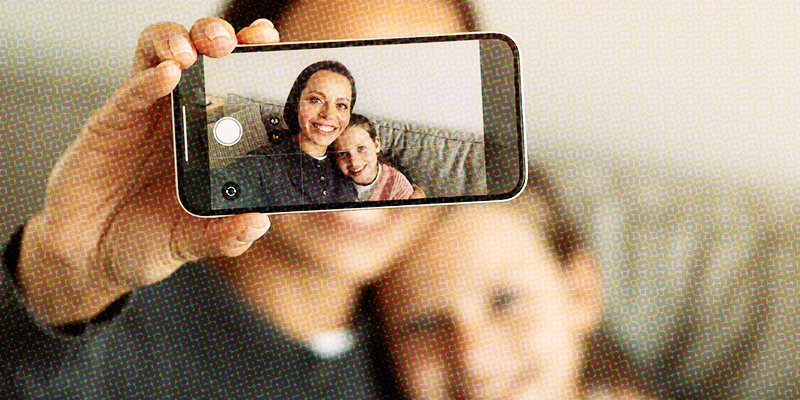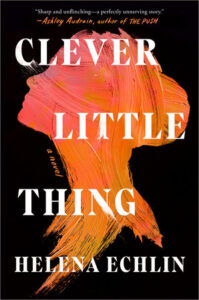When my kids were little, I knew a momfluencer who rescheduled her kindergartener’s birthday party because the light wasn’t right for photos. I laughed, but underneath was jealous, because she clearly had the world’s most easygoing child. Mine would freak if I rescheduled a trip to the park, let alone a birthday party. I always knew that society judges mothers, but it wasn’t until I had children that I realized how much moms judge each other, and how much social media amps up the stress. Modern motherhood is struggle enough, and when you throw in the mommy-judging—which gets inside your head—well, the pressure can make a woman crack up. No wonder so many psychological thrillers, including my novel Clever Little Thing, feature a mother doing just that.
Personally, I don’t pay much attention to momfluencers, and I have no interest in looking pretty for a photo while making sourdough pancakes in a prairie dress. But when I look in the mirror and worry that I look tired, or feel guilty for giving my kids boxed cereal for breakfast, who’s to say that these women haven’t wormed themselves into my brain anyway? It’s far worse if you take momfluencers seriously, as shown in Chelsea Bieker’s brilliant novel, Madwoman. Mother-of-two Clove obsesses about attaining the life of the perfect crunchy Instagram mom. She gets trapped in what Sara Petersen, author of the nonfiction book, Momfluenced, calls: a vicious cycle of aspiration, consumption, and self-loathing.” Clove compulsively shops for organic infant skin cream that costs $19 an ounce and performs #unplugged motherhood on Instagram with pictures of “my kids from the back skipping down narrow dirt paths.” But none of it makes her feel better until she realizes that what she needs to do isn’t to make motherhood look good, but to feel good, and she can only do this by resolving her relationship with her own mom.
The second wave of momfluencers rebelled against curated perfection, and proclaimed their #authenticity. In Ellery Lloyd’s People Like Her, Emmy Jackson, aka @MamaBare, posts about endless bottom-wiping and splotches of spaghetti sauce on her shirt, and wants to start “a more authentic discussion about parenting.” But as long as a momfluencer is producing sponsored content, her life must be aspirational. When Emmy preps her home for a photo shoot, she makes sure the artful mess suggests #familyfun, including craft supplies and staging “a collapsed cushion fort.” Of course, truly authentic motherhood can’t be shown in #mamahoodinsquares, because the real thing is often too consuming and exhausting to document. In Clever Little Thing, my protagonist Charlotte watches videos other parents have posted of their kids’ meltdowns, hoping to feel solidarity about her daughter’s epic freakouts, but instead she feels alienated. “If you can take a step back and film it, it’s not that bad.”
Chasing after the ideal #momlife is not only futile, but can interfere with actually being a mom. In novels, some desperate momfluencers put content first and kids second. In You Will Never Be Me, Aspen forces her young daughters to pretend to wake up and recite their lines ad nauseam until she has the perfect “morning routine” video. And in Erin Quinn-Kong’s Hate Follow, when her husband dies, momfluencer Whitney posts a shot of her eleven-year-old daughter, face contorted in grief, standing over his open coffin. When Mia later protests, Whitney doesn’t want to take it down, because the picture down, because it engages her fans emotionally. Mia eventually sues Whitney for violation of privacy.
You can bet that other people judge Whitney and she judges herself. A mother internalizes the critical voices around her, whether she wants to or not. What mom hasn’t stressed about the right weaning food or sleep-training method and wondered if she’s doing it right? And when a child undergoes a mysterious and abrupt change—as Stella does in my novel—then the judgmental voices in her head can drive a woman mad. Charlotte’s task as a mother is to decide whether to listen to what everyone else is telling her is going on with her daughter, or to listen to her gut. And that isn’t easy, because when moms let momfluencers tell them what to do, they risk disconnecting from their own maternal instinct
Motherhood today is overwhelming, thanks to the lack of traditional support networks, affordable childcare and neighborhood play. I’ve come to understand that judging others is a small way to get some power back when you feel powerless. In my novel, Charlotte judges other moms, but not because she’s a horrible person. She has no extended family support, everyone around her is telling her how to parent, and she gets no school support for her daughter’s neurodivergence. Judging others is her way of making herself feel a little better.
I try not to judge other moms these days, even when their kid is seventeen years old and still only eats buttered pasta. I remind myself that nobody except the parents knows what it takes to take care of that particular kid, and that some of my parenting decisions doubtless seem eccentric to others too. This helps me to be more compassionate toward myself too, to blame myself less when my kids struggle. I don’t look at momfluencers on social media, because they test my resolve not to judge too much (as when @BallerinaFarm competed in a Mrs. World pageant days after giving birth).
As for the momfluencer who rescheduled her kid’s birthday party, she made her way into my novel, as Charlotte’s friend Emmy, who always wears a chic, stripy ensemble, whose daughter Lulu sports Insta-worthy braids. Charlotte and Emmy judge each other. But over the course of the novel, they find that the one thing that can make you feel better than judging other moms is finding solidarity with them.
I wish I could say that I made friends with the real-life momfluencer. I tried. I thought that despite her oversized sunglasses and invariably stripy sundress, despite her three well-behaved daughters in matching outfits, underneath she was surely just a mess like every other mom I knew. But I never got her to admit it. So I made friends with the women like me, whose idea of chic was a shirt that the kids had not wiped their noses on. Women who admitted they were cracking up under the pressure of motherhood. And these are the women I love to read about. It disturbs me to look the feed of a mom who seems to have it all figured out. But it’s strangely comforting to read a thriller about a mom who loses it.
***


















